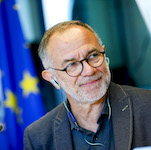
The huge challenges of ‘Fourche à la Fourchette’
The European Commission finally presented last May the “Fourche à la Fourchette” project. This is an opportunity to share my vision with you on what this programme should be, but also on what should be done to get the bar back on track. For me, promoting agriculture, the work of farmers, short supply chains, agroecology, reducing the use of chemicals, supporting all actors towards a green transition and ensuring healthy food of sufficient quality and accessible to all are the objectives to be achieved.
This is a famous challenge, but it is in fact a minimum for a transition that is more environmental, sustainable and more respectful of the demands of European citizens.
A real reform of the PAC.Our analysis starts with a finding of echec. The Common Agricultural Policy should be substantially reformed and this reform should coincide with the design of the European Green Deal. However, it was essential to build bridges between the two projects.Unfortunately, this is not the case, far from that. The vote in the European Parliament confirmed my concerns. This CAP is a disaster and will probably be the last one, in any case under this name. Indeed, the CAP has lost its “C”; It no longer has anything “common” since it advocates renationalisation and pushes Member States towards agricultural dumping. The question arises as to the European Commission’s suicidal strategy of de-empowering and giving the Member States the levers of power. As a health and environmental crisis, it is more than ever the time to assert a European response and consolidate the European Union. With this text, it is more disappointing than ever. Moreover, this new common agricultural policy commends the vast majority of the environmental objectives that should have been its own: A real blow that jeopardises the future of agriculture, the future of farmers, but also jeopardises the introduction of the green deal.
I am very enthusiastic about the project from farm to fork, or biodiversity, but I sincerely doubt that the European Commission’s will live up to their promise of an effective climate battle.
Environment vs Food safety: No! I would like to add another key point: for me, the environ- mental transition and food security are closely linked and, above all, they do not oppose, as some say, often those who would like nothing to change and for whom the benefit outweighs the health, the environment and the economy of the regions. It is imperative that the Farm to Fork project also sends this message of an eco-responsible Europe. CourtsDisposal of diversified agriculture in each territory is an example of the complementarity between environmental transition and food security: It is a guarantee of a more secure supply, better for biodiversity while reducing transport in the short term. Short proximity chains are more environmentally-friendly and more resilient to crises: They need to be promoted and strengthened! Pesticide: It is essential to put in place concrete measures, including legislation, to significantly reduce the use and risk of chemical pesticides, as well as the use of fertilisers and antibiotics.
Similarly, for a real environmental transition, it is necessary to put an end to this toxic reflexion to replace one active chemical with another, rather than to work towards non-chemical alternatives and to call agroecology and digitalisation.
Agri-environments 27 % of national greenhouse gas emissions are now attributed to intensive agriculture. Agroecology offers environmentally-friendly technical, social and political alternatives. Here too, Europe has a role to play.
The impact of Covid 19 on the avenirThe agricultural sector, during this health crisis, has never stopped supplying Europeans with food, despite the danger. however, Covid 19 also accentuated or highlighted numerous shortcomings. The lack of storage capacity, food surplus or stock disruption, the danger of price hypervolatility, the precariousness of many small farmers living on far too low incomes, working conditions and work contracts for drivers and seasonal workers. down- stream, the question also arises of access to healthy food for the most vulnerable populations, while we are announcing a doubling of hunger in the world at the end of the crisis. Reconciling food security with sustainable agriculture, consumption production and the environment must be a priority. The status quo is not a viable alternative, only profound reforms will allow us to build tomorrow.




